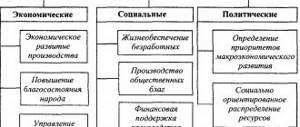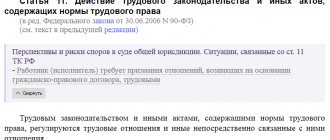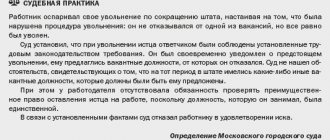Employer's rights
The list of employer rights contains the norms of his behavior with employees. They can be divided into three groups according to the type of relationship:
- employer and individual employee;
- employer and workforce;
- between different employers.
In relation to a specific employee, the employer can:
- hire and fire by concluding and terminating employment contracts;
- demand from hired persons compliance with discipline, performance of duties in accordance with the employment contract and careful attitude towards material assets;
- encourage employees by any means (material and moral) for conscientious performance of duties;
- apply penalties to violators in material terms or in a disciplinary manner.
In relation to the team, the employer has the right:
- conclude collective agreements bilaterally;
- adopt collective acts of local significance;
- organize collective bargaining;
- create works councils;
- carry out an assessment of the conditions that exist at work places.
Rights are also defined that relate to relationships between employers, and consist of the provided opportunity to create or represent in associations of employers to protect their interests.
Almost every paragraph of Article 22 defines restrictions on the rights of the employer within the framework of the labor code or other laws at the federal level.
Responsibility
Since the Labor Code of the Russian Federation provides for the rights and obligations of the employer under an employment contract, liability has been introduced for violation of these requirements. It is divided into material, administrative, criminal. The same types of liability apply to the employer's officials, and they may also be subject to disciplinary action up to and including dismissal.
For violation of what obligation of the employer to the employee and the team will the organization be punished? The Code of Administrative Offenses of the Russian Federation provides for fines for:
- non-compliance with labor standards (a total of 7 offenses under Article 5.27 of the Code of Administrative Offenses of the Russian Federation);
- failure to comply with labor safety requirements (5 offenses under Article 5.27.1 of the Code of Administrative Offenses of the Russian Federation);
- avoidance of participation in negotiations on collective agreements, failure to provide the necessary information, refusal to sign agreements or fulfill agreements on them (Articles 5.28 - 5.33 of the Code of Administrative Offenses of the Russian Federation);
- non-compliance with the requirements for the employment of disabled people (5.42 of the Code of Administrative Offenses of the Russian Federation) and foreign citizens (Articles 18.9, 18.15–18.17, 18.19 of the Code of Administrative Offenses of the Russian Federation).
Financial liability for an organization arises not only in case of compensation for damage for a damaged item, but also in case of delay in wages and other payments, in case of failure to issue a work book and other mandatory documents, in case of illegal dismissal (suspension from work) or failure to provide work (during downtime).
As for criminal liability, this is the maximum penalty if the employer’s basic obligations under the Labor Code are not observed. But it is assigned only to officials. There are 5 reasons why a manager (deputy, chief accountant, head of the personnel department and other employees in management positions) can be convicted:
- discrimination (Article 136 of the Criminal Code of the Russian Federation);
- non-compliance with labor protection requirements (Article 143 of the Criminal Code of the Russian Federation);
- unjustified refusal to hire or illegal dismissal of a pre-retirement person (Article 144.1 of the Criminal Code of the Russian Federation), a pregnant woman or a woman with children under 3 years of age (Article 145 of the Criminal Code of the Russian Federation);
- non-payment of wages and other payments (Article 145.1 of the Criminal Code of the Russian Federation).
Employer Responsibilities
The basic rights and responsibilities of the employer are defined as corresponding to the rights and responsibilities of employees, and are mostly devoted to the protection of these rights.
All responsibilities can be divided into three groups, namely, those that relate to individual employees, work collectives and government bodies.
In relation to the state, the employer is obliged:
- comply with legal labor standards;
- comply with the instructions of federal regulatory authorities that monitor compliance with labor laws.
Responsibilities to the workforce and individuals are as follows:
- provide work, as well as everything necessary for its implementation;
- pay wages on time and in full, observing the principle of equal pay for work of equal value, as well as provide social insurance for each employee;
- organize conditions for labor protection at the level of state standards, as well as pay compensation to employees for damage to health within the framework of legislative acts;
- sign collective agreements regulating labor relations in the team;
- familiarize employees with local acts (orders, regulations, rules, etc.) against signature;
- involve workers in participation in management, including the protection of their interests within the framework of labor legislation.
For violation of these duties, various types of punishment are provided in the form of fines, dismissal from office and prohibition from working as a manager.
Article 22 of the Labor Code of the Russian Federation. Basic rights and obligations of an employer
1. An employment contract is an agreement concluded between two parties: the employee and the employer. Reflecting the bilateral nature of the employment contract, the Code provides not only the basic rights and obligations of the employee, but also the basic rights and obligations of the employer. The previous Code formulated only the basic labor rights and obligations of the employee.
The commented article enumerates the basic rights of the employer beginning with his right to conclude, amend and terminate employment contracts with employees. This right is exercised in the manner and on the grounds specified in the Code and other federal laws. The general procedure for concluding, amending and terminating an employment contract at the initiative of the employer is provided for in the Code; the specifics of this procedure, as well as additional grounds for terminating an employment contract, are specified in federal laws. Thus, the specifics of concluding an employment contract with citizens entering the state civil service are provided for in the Law on the State Civil Service. It should be taken into account that this Law uses the term “service contract” instead of the concept of “employment contract”. The Federal Law of January 13, 1996 N 12-FZ “On Amendments and Additions to the Law of the Russian Federation “On Education” (SZ RF. 1996. N 3. Art. 150) specifies the specifics of terminating an employment contract with teaching staff of an educational institution .
2. Legal equality of the parties when concluding an employment contract also extends to the conduct of collective negotiations and the conclusion of a collective agreement. The employer, like the employees, has the right to make a proposal to start collective bargaining, and the other party - the employee representatives - is obliged to enter into negotiations within 7 days. In practice, in most cases, the initiative to conduct collective bargaining is taken by employee representatives.
The concluded collective agreement is signed by its parties, i.e. representatives of employers and employees. These provisions are summarized by the commented article by including among the fundamental rights of the employer the right to enter into collective bargaining and conclude a collective agreement.
3. Article 22 of the Labor Code of the Russian Federation is closely related to the previous article. The employee’s rights provided for in Article 21 of the Labor Code of the Russian Federation correspond to the corresponding responsibilities of the employer, enshrined in Art. 22, and, conversely, the employee’s duties correspond to the employer’s rights to demand their fulfillment. Yes, Art. 21 of the Labor Code establishes the employee’s obligation to comply with labor discipline, and Article 22 of the Labor Code of the Russian Federation - the employer’s right to demand that the employee fulfill labor duties. If these duties are fulfilled in good faith, the employer has the right to reward employees, and if labor discipline is violated, to bring them to disciplinary liability.
4. The basic rights and obligations of the employer, formulated in Article 22 of the Labor Code of the Russian Federation with commentaries, are specified in other regulatory legal acts, as well as in employment contracts. They reflect the expansion of the employer’s powers and increasing his responsibility in a market economy.
The legislator, while reducing the scope of centralized regulation of labor issues, simultaneously expands the contractual nature of establishing working conditions. One of the fundamental rights of an employer is to adopt, within the limits of its powers, local regulatory legal acts on labor, which are mandatory for employees who have entered into employment contracts with him. This right does not belong only to employers - individuals who enter into employment contracts for personal services and assistance with housekeeping.
5. Of great importance for social partnership, concluding agreements with authorized representatives of employees at the federal, sectoral, regional and territorial levels is the right of the employer to create and join associations of employers in order to represent and protect their interests.
According to the Law on Associations of Employers, an association of employers has the right:
- to form a coordinated position of members of the association of employers on issues of regulation of social and labor relations and related economic relations and defend it in relations with trade unions and their associations, government bodies, and local governments;
- coordinate with other associations of employers the position of the association of employers on the regulation of social and labor relations and related economic relations;
- to defend the legitimate interests and protect the rights of its members in relations with trade unions and their associations, government bodies, and local governments;
- take the initiative to conduct collective bargaining for the preparation, conclusion and amendment of agreements;
- give its representatives the authority to conduct collective negotiations on the preparation, conclusion and amendment of agreements, participate in the formation and activities of relevant commissions for the regulation of social and labor relations, conciliation commissions, labor arbitration for the consideration and resolution of collective labor disputes;
- make, in the prescribed manner, proposals for the adoption of laws and other normative legal acts regulating social and labor relations and related economic relations and affecting the rights and legitimate interests of employers, and participate in their development;
- take part, in accordance with the established procedure, in the implementation of measures to ensure employment of the population;
- conduct consultations (negotiations) with trade unions and their associations, executive authorities, local governments on the main directions of socio-economic policy;
- receive from trade unions and their associations, executive authorities, local governments the information they have on social and labor issues necessary for conducting collective bargaining in order to prepare, conclude and amend agreements, and monitor their implementation;
- participate in monitoring and forecasting the needs of the economy for qualified personnel, as well as in the development and implementation of state policy in the field of vocational education, incl. in the development of federal state educational standards and the development of federal state requirements for additional professional educational programs, the formation of lists of areas of training (specialties) of vocational education, state accreditation of educational institutions of vocational education in the manner established by the Government of the Russian Federation.
This list of rights is not exhaustive. The association's charter may provide for other rights.
6. Article 22 of the Labor Code of the Russian Federation formulates the responsibilities of employers that are assigned to them to implement the rights of employees. Some of them directly relate to the rights of individual workers, others relate to collective rights. Thus, the right of employees to collective bargaining and the conclusion of a collective agreement obliges the employer to conduct collective negotiations, conclude a collective agreement, and provide employee representatives with complete and reliable information necessary for concluding and monitoring the implementation of a collective agreement.
In order to implement the constitutional right of citizens to work in conditions that meet the requirements of occupational safety and health, the Code, among the main ones, provides for a number of responsibilities of the employer in the field of labor protection. These include the following responsibilities: to ensure safety and working conditions that comply with the state regulatory requirements for labor protection established in the Russian Federation; promptly comply with the instructions of federal executive authorities authorized to conduct state supervision and control; pay fines imposed for violations of laws and other regulatory legal acts on labor; consider submissions from the relevant trade union bodies and other representatives elected by employees about identified violations of laws and other regulatory legal acts on labor, on labor protection and report on the measures taken (see commentary to Articles 212, 224).
The new version of Article 22 of the Labor Code of the Russian Federation provides, among other obligations of the employer, the need to familiarize the employee, upon signature, with the adopted local regulatory legal acts directly related to his work activity. Such familiarization clarifies the rights and obligations of the parties to the employment contract and helps eliminate conflicts that arise due to employees’ ignorance of local regulations adopted by the employer.
It is important for workers to provide them with sanitary, medical and preventive services: sanitary facilities, premises for eating, etc. Therefore, the commented article includes among the main responsibilities of the employer the need to provide for the everyday needs of workers related to the performance of their work duties.
Article 22 of the Labor Code of the Russian Federation formulates a number of employer responsibilities differently compared to the Labor Code. These include the obligation to pay employees full wages within the time limits established by the Code, collective agreement, internal labor regulations, and employment contracts. In addition, failure to fulfill the corresponding obligation entails the application of sanctions that were previously absent in labor legislation (see commentary to Article 142).
This is due to the need to tighten requirements for employers who grossly violate their most important duty - to promptly and fully pay the employee for the work he has expended.
The list of employer responsibilities provided for in the commented article is not exhaustive. The Code emphasizes that the employer is obliged to fulfill other obligations arising from labor legislation, collective agreements, agreements and employment contracts.
Association of employers
To expand the powers of business structures in managing the country's economy, such forms as associations of employers are provided.
These associations take measures to coordinate the positions of participants, protect their interests, interact with other similar associations, as well as establish relations with state and local authorities, trade unions and labor collectives.
Employers' associations have the right to take initiatives to develop new laws, consult with various bodies and receive from them information that is necessary for the activities of the associations and their members.
Author of the article
Employee rights
Of course, the rights of an employee directly depend on the duties that the employer will perform.
In general, an employee has the right:
- Conclude, amend and terminate an employment contract;
- Carry out the work specified in the contract;
- Get a workplace that meets all safety requirements;
- Receive payment for your work within the period specified in the contract;
- Work in accordance with the work schedule established by the contract;
- Receive information about the hazards of work;
- Gain additional knowledge and study to improve your skills;
- Be a member of a trade union;
- Participate within acceptable limits in the life of the organization;
- Protect your interests in ways not prohibited by law;
- Receive compensation for harm;
- Receive payment for sick days, holidays, and overtime in accordance with the Labor Code;
- Receive pension contributions, etc.
Employer as a subject of labor law
As a rule, employers are organizations of any form of ownership that enter into employment contracts with citizens, providing them with specific work. These can be state, municipal, commercial organizations, as well as individual entrepreneurs.
Finished works on a similar topic
- Course work Responsibilities and rights of employers 430 rub.
- Abstract Responsibilities and rights of employers 250 rub.
- Test work Responsibilities and rights of employers 220 rub.
Receive completed work or advice from a specialist on your educational project Find out the cost
However, not only a legal entity or an individual has the right to be an employer. In accordance with the federal law of May 19, 1995 N82-FZ “On Public Associations”, trade union organizations and other public associations have the right to conclude labor contracts with citizens. In addition, Article 23 of the Labor Code of the Russian Federation provides such powers to state authorities and local governments.
Note 1
Employers have labor legal personality and legal capacity . The first is determined by the production tasks and charters of organizations, and the second is determined by the presence of state registration of a legal entity, wage fund and staffing table.
The legal status of an employer requires compliance with labor laws that guarantee the protection of the fundamental rights of workers. All obligations imposed on the employer by laws, contracts or agreements are subject to mandatory fulfillment.
An employer is a multifaceted figure. He acts not only as a party to the employment contract, but also as a participant in various legal relations. At the same time, the employer is both a person ensuring that citizens exercise their right to work and social security, and a tax agent, since it is obliged to timely transfer employee tax contributions to the state budget.
Do you need to select material for your study work? Ask a question to the teacher and get an answer in 15 minutes! Ask a Question
Legislative regulation
All labor relations are subject to the jurisdiction of the Labor Code of the Russian Federation. The rights and obligations of the employer, as a party to labor relations, include the materials of Art. 22. The text of the article contains a list of the employer’s powers, which is very convenient for use in practice. And in case of violation of rights or failure to fulfill prescribed obligations, it is easy to trace the legislative basis for protecting your interests.
IMPORTANT! The list is quite complete, but not exhaustive; the article explains within the framework of which the employer’s responsibilities arise and how his rights are limited.
What does the Labor Code of the Russian Federation say about guarantees for workers?
The basic rights and responsibilities of an employee are determined by Art. 21 Labor Code of the Russian Federation. A person who has signed an employment contract has the right to count on:
- correct conclusion, amendment and termination of employment agreements;
- provision of work and workplace specified in the contract;
- timely and full payment of labor;
- proper rest - breaks between shifts (weeks) and vacation;
- reliable and complete information about working conditions and safety rules in the workplace;
- obtaining the opportunity to study and improve qualifications;
- association and joining trade unions;
- conducting negotiations on increasing the level of security and providing additional guarantees;
- protection of rights and freedoms, including in court and through strikes;
- compensation for harm, including moral damage, caused during the performance of labor functions;
- compulsory social insurance.
The list presented cannot be shortened under any circumstances. Otherwise, the employer will be held accountable - administrative or criminal (depending on the requirements violated). But the list of guarantees can be expanded. How much depends on the capabilities of the employer.
With regard to the duties of employees, also listed in Art. 21 of the Labor Code of the Russian Federation, these include:
- conscientious performance of labor functions;
- compliance with internal regulations and discipline;
- compliance with labor safety standards and requirements;
- careful attitude towards the property of the employer and colleagues;
- notification of an emergency situation that threatens the life and health of people and the safety of property.
If we talk about the rights and responsibilities of workers in production, they are supplemented by the need to eliminate the consequences of natural or man-made disasters, accidents, emergencies, or to perform work to prevent them.
What are his responsibilities?
In addition to basic rights, there are obligations of the employer that he must fulfill:
- do not violate and strictly comply with Russian legislation;
- provide workers with safe and normal working conditions;
- provide employees with the necessary equipment, labor tools, devices, etc.;
- pay mercenaries wages that are commensurate with their qualifications, the amount of work performed, the position held, etc.;
- provide employees with reliable information about the terms of the contract and other important information;
- carry out collective bargaining, etc.
The employer's responsibilities must be fulfilled in full, as they are directly aimed at ensuring proper interaction with employees. If they are not followed, it will affect everyone in the organization.
It's fast and free!







